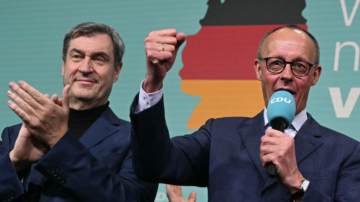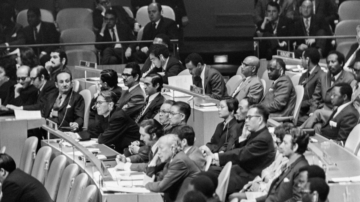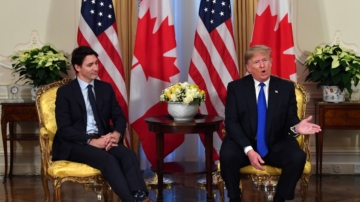【新唐人2012年11月21日讯】缅甸,数十年来都是中国的友好邻邦,最近几年,缅甸大刀阔斧进行政治改革,与西方互动频繁。美国总统奥巴马当选后的第一次外访,选定了东南亚三国,其中包括缅甸,奥巴马成为美国史上第一位访问缅甸的在任总统。奥巴马还与缅甸反对党领袖、民主派偶像昂山素季(Aung San Suu Kyi)举行了会晤。有媒体认为,缅甸对西方国家开放,削弱中共影响,对中共政府是一个重击。下面请听专家分析。
缅甸政府因“独裁”,一直受到西方国家孤立,目前缅甸正从军事专政走向民主体制。吴登盛去年2月当选缅甸总统,就任后,他推行政治改革和全国和解,随后,美国和欧洲联盟等放松对缅甸的制裁。
19号,奥巴马在国务卿希拉里•克林顿陪同下抵达缅甸大城仰光,对缅甸进行了6小时的访问。与缅甸总统吴登盛的会面中,奥巴马表明:美方希望缅甸继续推进政治和经济改革。
据报导,奥巴马考虑重新恢复中断多年的对缅援助项目。按计划,美方有望给予缅甸1.7亿美元援助。不过,美方官员表示,美方援助力度“会视缅甸政府推行政治改革的进展而定”。
独立评论员邢天行:“在缅甸政府搞独裁这段期间,她(美)是对她(缅甸)进行封锁的。那么,现在缅甸政府她展示出一个融入世界主流这样一个姿态,尤其是对昂山素季态度的变化,使得缅甸向世界打开了一个新的窗口,美国在态度上是非常积极的。”
奥巴马与吴登盛会晤后,面见了缅甸全国民主联盟领袖昂山素季。
独立评论员邢天行认为,缅甸当局正积极展现政治改革的诚意。
邢天行:“因为奥巴马在访问之前和期间,也是释放了很多的政治犯。所谓政治犯,就是原来反政府的,也就是反对它独裁的,既然它(缅甸当局)能这样做的话,它也是给外界展示出它真诚的愿望。所以我想,这都是能够对缅甸这个国家,带来新希望的一种积极的做法。”
“山东大学”退休教授孙文广也认为,奥巴马访问缅甸能够促进缅甸的民主化,同时影响中国民众。
“山东大学”退休教授孙文广:“当然,中国最后决定(民主化)…是民间,民间是不是觉醒?是不是奋起?反对派是不是能够团结?这是基本的!”
香港《大公网》评论说,“如今的缅甸已经不是2年多前畏缩改革的缅甸,更不是10多年前被国际社会制裁的只能和中国往来的缅甸。缅甸已经开放了党禁、报禁,已经用‘民意牌’暂停了中国在缅甸的水电站项目,已经用‘民主牌’从西方吸引来了赞美和援助。缅甸的改革没有回头路,昂山素季和反对派当政只是时间的问题。”
邢天行:“如果昂山素季在缅甸的影响力更大,或者说,她已经当政,中共政府必然是会跟她去接触的。现在之所以没有积极的采取一个态度,是因为它固有的对昂山素季这样一个民主派的敌视,尤其是昂山素季在东南亚地区这个影响,有可能对中国人更有一种积极的启发作用。所以中共这个体制,采取的措施都是抵制民主的。”
《大纪元》新闻网报导,中共政府曾在财力上长期支持缅甸军政府,并且在缅甸开采自然资源。缅甸对西方国家开放,从而削弱中共影响,对中共政府是一个重击。
不过也有分析认为,奥巴马对缅甸的访问依然存在政治风险,因为缅甸目前的民主转型虽然发展迅速,但依旧脆弱,目前缅甸军方对国家依然具有影响力,在缅甸北部,军方与少数民族——克钦族的战争还在继续﹔发生在今年6月的缅甸佛教徒与穆斯林民众之间的暴力冲突,曾导致近100人死亡,在确保穆斯林村民的安全方面,缅甸政府被批评措施不够。
采访/田净 编辑/周平 后制/钟元
Obama's Visit to Burma - A Heavy Blow to the CCP?
For decades Myanmar has been China's friendly neighbor.
In recent years the country carried out drastic political
reform and is interacting frequently with the West.
U.S. President Barack Obama's first overseas trip
after re-election included three Southeast Asian countries.
Myanmar is one of them. Obama is the first U.S. president,
to visit Myanmar during his tenure.
Obama also met with Myanmar's opposition leader,
idol of democracy Aung San Suu Kyi.
Media stated that Myanmar's opening to the West
weakens the Chinese Communists Party' (CCP) impact.
Commentators see this
as a heavy blow to the CCP.
Myanmar government has been isolated by the West
due to its dictatorship.
Currently Myanmar is transitioning
from a military dictatorship to a democratic system.
Thein Sein was elected as a president in February 2011.
After he took office, he introduced a political reform.
Soon the U.S. and the European Union
relaxed sanctions against Myanmar.
Obama and the Secretary of State Hillary Clinton arrived
in Yangon on November 19, for a six-hour visit of Myanmar.
During their meeting with Thein Sein, Obama expressed
the U.S.' hope for Myanmar to continue promoting the political and economic reform.
Obama is considering to resume assistance projects
in Myanmar, which were stopped for years.
According to plan, the U.S. is expected to provide Myanmar
with a $170 million fund for aid.
However, U.S. expressed, the assistance effort "depends on
the Myanmar government's progress of political reforms.”
Xing Tianxing, independent commentator: "U.S. blocked
Myanmar during the time when it was ruled by dictators.
Now the Myanmar' government demonstrated a will
to merge into the mainstream of the world.
Especially with its attitude toward Aung San Suu Kyi,
Myanmar opens up a new window to the world.
The U.S. looks very positively on this."
After his meeting with Thein Sein, Obama met with
the Democratic Alliance of Burma' leader Aung San Suu Kyi.
Xing Tianxing thinks the Myanmar government is actively
expressing its sincerity regarding a political reform.
Xing Tianxing: “Prior to and during Obama's visit,
the Myanmar government released many political prisoners.
The so-called political prisoners are against the government,
hence against its authoritarian system.
This action showcases its sincere desire to the outside world.
These positive approaches will bring new hope to Myanmar.”
Retired professor of Shandong University Sun Wenguang
also thinks Obama's visit will promote democratic transition in Myanmar and will also influence people in China.
Sun Wenguang: “Of course it will be the Chinese people
who are the eventual force on China's democracy path.
Will people wake up and fight for it?
Will the oppositions unite? This is the key!”
HK's takungpao.com commented, "Myanmar is no longer
the country of two years ago, when it was afraid of reforms.
It's different than even 10 years ago, when it could only
deal with China due to international community' sanctions.
Myanmar has lifted up the ban on political party and media,
and has followed its people will to suspend China's hydropower projects in Myanmar.
It showcased democracy, attracting praises and aid
from the West. Myanmar's reform is not going back.
Aung San Suu Kyi and the opposition coming to power
is only a matter of time.”
Xing Tianxing: “If Aung San Suu Kyi has a greater influence
in Myanmar, or if she takes power, CCP must deal with her.
The CCP has not actively adjusted its attitude because
of its inherent hostile attitude toward democracy.
Aung San Suu Kyi's influence in Southeast Asia
might be a positive inspiration to the Chinese people.
The CCP attitude and actions
are always negative toward democracy.”
According to The Epoch Times, CCP once supported Burma'
military government financially, and develops and uses the county's natural resources.
Myanmar's opening to the West weakens CCP's influence.
Thus the current events seem like a heavy blow to the CCP.
However, some analysts believe there is political risk
for Obama to visit Myanmar.
The democratic transition of Myanmar,
although rapid, is yet fragile.
The Myanmar military still has influence in the country and
continues to battle against minorities in northern Myanmar.
The violent clashes in June 2011, between Myanmar
Buddhists and Muslims led to nearly 100 deaths.
The government was criticized for lack of measures
to ensure the safety of Muslim villagers.
缅甸政府因“独裁”,一直受到西方国家孤立,目前缅甸正从军事专政走向民主体制。吴登盛去年2月当选缅甸总统,就任后,他推行政治改革和全国和解,随后,美国和欧洲联盟等放松对缅甸的制裁。
19号,奥巴马在国务卿希拉里•克林顿陪同下抵达缅甸大城仰光,对缅甸进行了6小时的访问。与缅甸总统吴登盛的会面中,奥巴马表明:美方希望缅甸继续推进政治和经济改革。
据报导,奥巴马考虑重新恢复中断多年的对缅援助项目。按计划,美方有望给予缅甸1.7亿美元援助。不过,美方官员表示,美方援助力度“会视缅甸政府推行政治改革的进展而定”。
独立评论员邢天行:“在缅甸政府搞独裁这段期间,她(美)是对她(缅甸)进行封锁的。那么,现在缅甸政府她展示出一个融入世界主流这样一个姿态,尤其是对昂山素季态度的变化,使得缅甸向世界打开了一个新的窗口,美国在态度上是非常积极的。”
奥巴马与吴登盛会晤后,面见了缅甸全国民主联盟领袖昂山素季。
独立评论员邢天行认为,缅甸当局正积极展现政治改革的诚意。
邢天行:“因为奥巴马在访问之前和期间,也是释放了很多的政治犯。所谓政治犯,就是原来反政府的,也就是反对它独裁的,既然它(缅甸当局)能这样做的话,它也是给外界展示出它真诚的愿望。所以我想,这都是能够对缅甸这个国家,带来新希望的一种积极的做法。”
“山东大学”退休教授孙文广也认为,奥巴马访问缅甸能够促进缅甸的民主化,同时影响中国民众。
“山东大学”退休教授孙文广:“当然,中国最后决定(民主化)…是民间,民间是不是觉醒?是不是奋起?反对派是不是能够团结?这是基本的!”
香港《大公网》评论说,“如今的缅甸已经不是2年多前畏缩改革的缅甸,更不是10多年前被国际社会制裁的只能和中国往来的缅甸。缅甸已经开放了党禁、报禁,已经用‘民意牌’暂停了中国在缅甸的水电站项目,已经用‘民主牌’从西方吸引来了赞美和援助。缅甸的改革没有回头路,昂山素季和反对派当政只是时间的问题。”
邢天行:“如果昂山素季在缅甸的影响力更大,或者说,她已经当政,中共政府必然是会跟她去接触的。现在之所以没有积极的采取一个态度,是因为它固有的对昂山素季这样一个民主派的敌视,尤其是昂山素季在东南亚地区这个影响,有可能对中国人更有一种积极的启发作用。所以中共这个体制,采取的措施都是抵制民主的。”
《大纪元》新闻网报导,中共政府曾在财力上长期支持缅甸军政府,并且在缅甸开采自然资源。缅甸对西方国家开放,从而削弱中共影响,对中共政府是一个重击。
不过也有分析认为,奥巴马对缅甸的访问依然存在政治风险,因为缅甸目前的民主转型虽然发展迅速,但依旧脆弱,目前缅甸军方对国家依然具有影响力,在缅甸北部,军方与少数民族——克钦族的战争还在继续﹔发生在今年6月的缅甸佛教徒与穆斯林民众之间的暴力冲突,曾导致近100人死亡,在确保穆斯林村民的安全方面,缅甸政府被批评措施不够。
采访/田净 编辑/周平 后制/钟元
Obama's Visit to Burma - A Heavy Blow to the CCP?
For decades Myanmar has been China's friendly neighbor.
In recent years the country carried out drastic political
reform and is interacting frequently with the West.
U.S. President Barack Obama's first overseas trip
after re-election included three Southeast Asian countries.
Myanmar is one of them. Obama is the first U.S. president,
to visit Myanmar during his tenure.
Obama also met with Myanmar's opposition leader,
idol of democracy Aung San Suu Kyi.
Media stated that Myanmar's opening to the West
weakens the Chinese Communists Party' (CCP) impact.
Commentators see this
as a heavy blow to the CCP.
Myanmar government has been isolated by the West
due to its dictatorship.
Currently Myanmar is transitioning
from a military dictatorship to a democratic system.
Thein Sein was elected as a president in February 2011.
After he took office, he introduced a political reform.
Soon the U.S. and the European Union
relaxed sanctions against Myanmar.
Obama and the Secretary of State Hillary Clinton arrived
in Yangon on November 19, for a six-hour visit of Myanmar.
During their meeting with Thein Sein, Obama expressed
the U.S.' hope for Myanmar to continue promoting the political and economic reform.
Obama is considering to resume assistance projects
in Myanmar, which were stopped for years.
According to plan, the U.S. is expected to provide Myanmar
with a $170 million fund for aid.
However, U.S. expressed, the assistance effort "depends on
the Myanmar government's progress of political reforms.”
Xing Tianxing, independent commentator: "U.S. blocked
Myanmar during the time when it was ruled by dictators.
Now the Myanmar' government demonstrated a will
to merge into the mainstream of the world.
Especially with its attitude toward Aung San Suu Kyi,
Myanmar opens up a new window to the world.
The U.S. looks very positively on this."
After his meeting with Thein Sein, Obama met with
the Democratic Alliance of Burma' leader Aung San Suu Kyi.
Xing Tianxing thinks the Myanmar government is actively
expressing its sincerity regarding a political reform.
Xing Tianxing: “Prior to and during Obama's visit,
the Myanmar government released many political prisoners.
The so-called political prisoners are against the government,
hence against its authoritarian system.
This action showcases its sincere desire to the outside world.
These positive approaches will bring new hope to Myanmar.”
Retired professor of Shandong University Sun Wenguang
also thinks Obama's visit will promote democratic transition in Myanmar and will also influence people in China.
Sun Wenguang: “Of course it will be the Chinese people
who are the eventual force on China's democracy path.
Will people wake up and fight for it?
Will the oppositions unite? This is the key!”
HK's takungpao.com commented, "Myanmar is no longer
the country of two years ago, when it was afraid of reforms.
It's different than even 10 years ago, when it could only
deal with China due to international community' sanctions.
Myanmar has lifted up the ban on political party and media,
and has followed its people will to suspend China's hydropower projects in Myanmar.
It showcased democracy, attracting praises and aid
from the West. Myanmar's reform is not going back.
Aung San Suu Kyi and the opposition coming to power
is only a matter of time.”
Xing Tianxing: “If Aung San Suu Kyi has a greater influence
in Myanmar, or if she takes power, CCP must deal with her.
The CCP has not actively adjusted its attitude because
of its inherent hostile attitude toward democracy.
Aung San Suu Kyi's influence in Southeast Asia
might be a positive inspiration to the Chinese people.
The CCP attitude and actions
are always negative toward democracy.”
According to The Epoch Times, CCP once supported Burma'
military government financially, and develops and uses the county's natural resources.
Myanmar's opening to the West weakens CCP's influence.
Thus the current events seem like a heavy blow to the CCP.
However, some analysts believe there is political risk
for Obama to visit Myanmar.
The democratic transition of Myanmar,
although rapid, is yet fragile.
The Myanmar military still has influence in the country and
continues to battle against minorities in northern Myanmar.
The violent clashes in June 2011, between Myanmar
Buddhists and Muslims led to nearly 100 deaths.
The government was criticized for lack of measures
to ensure the safety of Muslim villagers.








